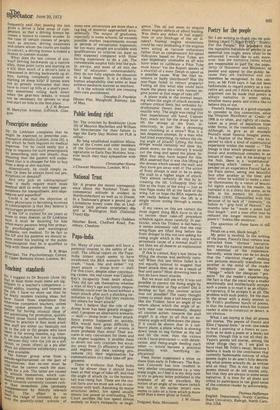Poetry for the people
Sir: I am writing to thank you tor publishing (April 7) Nigel Friths "Poetry: For the People." His argument that the narrative function of poetry is an essential one ought more often to be advanced. I would like to add, moreover, that the narrative torms which are responsible in part for the popularity of Housman and Betjeman ap pealed and appeal to the public because they are traditional and can therefore be recognised. In this century, as Mr Frith says, it has not been fashionable to regard poetry as a narrative art; and yet I think a reasonable argument can be made that poetry is always narrative in some sense, whether many poets and critics like to believe this or not.
Pound's Imagism is a good example to consider in this connection, since the 'Imagiste Manifesto' or ' Credo' of 1908 is so often, and rightly of course, taken as a point of departure from older forms, in the twentieth century. Although, to give as an example Pound's most famous Imagist poem, ' In a Station of the Metro' was expected to elicit a kind of supernatural experience within the reader — "The Image is that which presents an emotional and intellectual complex in an instant of time;" and, in his analogy to the Noh, there is a ' supernatural ' happening which ' comes ' — it depended on an experience Pound had in the Paris metro, seeing one beautiful face after another at the time; and later, when he wail-fed to make a similar illumination by a vision of beautiful sights available to his reader, he narrated it in a thirty line poem, as he tells in his memoir for Gaudier-, Brzeska (1916). Dissatisfied with this because of its lack of "intensity," its failure to " grip hold of Heaven," six months later he " made a poem half that length "; and a year after that he reduced the longer versions to the poem's " hokku-like sentence: , The aparition of these faces the' crowd;
Petals on a wet, black bough."
My point is twofold, In the writing of the poem, Pound's final version was extracted from 'obvious ' narrative: story was the natural mental habit for his retention of his experience. Secondly, while there can be no doubt that the "electrical charge" making two pictures mutually transform one another in the mind of the reader ideally receptive can become the " Image " which the ideogram " presents " for the reader's experiencing, the fact is that the usual way a reader emotionally and intellectually accepts such a poem is to read it as an elliptical narrative, if he accepts it at all. The problem with such poetry, for the man in the street with a dusty answer to Mr Frith 's proffered bunch of poems, is that the narrative which the trained reader is able to construct or detect, is not obvious.
What I am saying is that all poems tell stories. The poems of Pound and Eliot ("spatial form" or not: one needs to read a painting or a fresco as carebully as he does a poem or a book) tell stories, though this is not all they do. Yeats's poems tell stories, among the other things they do. I am glad to have read Mr Frith's essay, because I believe it leads to the conclusion that currently fashionable notions of what poems ought to do aren't fully describing what poems actually do, as written and as read. This is not to say that poems should or do tell stories only, but that they are always in some sense narrative. It is time for all poets and critics to participate in the good sense of the common reader by acknowledging this.
Thomas Heffernan English Department, North Carolina State University, Raleigh, North Carolina, USA.


































 Previous page
Previous page